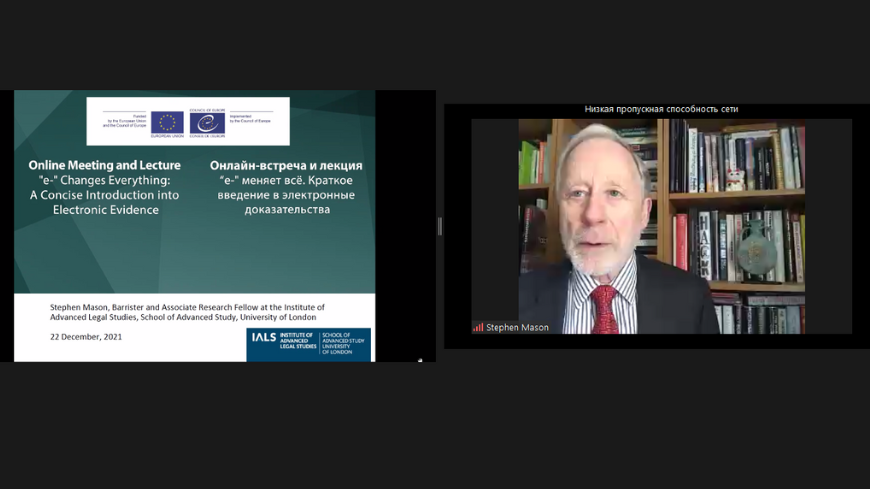On 22 December an online meeting for lawyers was organised by our project with the aim to strengthen co-operation between bar associations and law societies to improve the internal functioning and independence of the bars, in line with Council of Europe standards and recommendations.
At the meeting Stephen Mason, a recognized expert in electronic evidence and electronic signatures, delivered the keynote lecture "e-" Changes Everything: A Concise Introduction into Electronic Evidence”. Project partners and interested legal professionals were invited. Participants from eight countries registered for the event, live streamed on the website "Regional Cooperation Network of Lawyers In Armenia, Belarus, Georgia, Republic of Moldova And Ukraine.”
“As an institution that revolves around human rights, democracy and the rule of law, the Council of Europe has been active in producing work on electronic evidence in civil and administrative proceedings. To name just one key work, the Guidelines of the Committee of Ministers of the Council of Europe on electronic evidence in civil and administrative proceedings, adopted on the 30th of January 2019. These guidelines constitute the first international instrument in this field,” said Lilja Gretarsdottir, Head of the Cooperation Programmes Division, Directorate General of Human Rights and Rule of Law, Council of Europe, opening the event.
Dr Remigijus Jokubauskas, international consultant to the project, gave further details on the Guidelines on electronic evidence that remains more than relevant by the moment.
In the keynote lecture that followed, Stephen Mason highlighted the role of electronic evidence in civil and administrative proceedings and the challenges associated with their implementation, such as trustworthiness and proof of authenticity of such evidence. “When it comes to the electronic evidence, what is the original data? I think that the concept of “original” is not relevant in this context. Electronic data you’ve received on your computer is a copy of a copy of a copy. I think, what we should think about instead of “original” is a “first-in-time” evidence,” claimed Stephen Mason. As a renowned expert in electronic evidence and electronic signature, he has drawn many specific examples of treating the electronic evidence, such as emails or instant messaging, by the courts in Europe. After the lecture he answered numerous questions. The issues raised by the participants were of practical nature and demonstrated how often lawyers have to deal with digital evidence in court proceedings, including cases of domestic violence.
This event was organised in the framework of the project "Strengthening the profession of lawyer in line with European standards," funded by the European Union and the Council of Europe and implemented by the Council of Europe in their Partnership for Good Governance 2019-2022.




